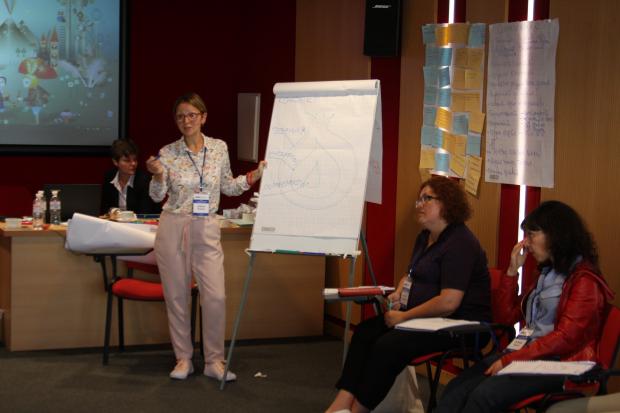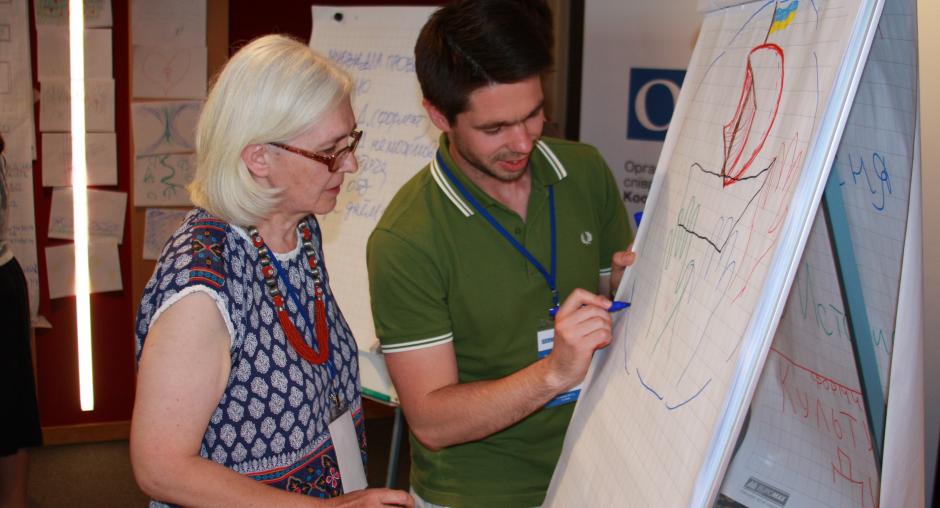Enhancing dialogue culture within Ukraine’s communities
In the autumn of 2014, a group of activists pulled down the statue of Vladimir Lenin in the central square of the eastern Ukrainian city of Kharkiv. Their opponents protested and announced that they intended to restore the symbol of the Soviet era. In the resulting scuffle around the monument’s remnants, several people were injured. The city was divided and the situation began to grow dangerous.
Olena Kopina, a sociologist, decided she had to do something to defuse tensions. Together with her colleagues from the Foundation for Local Governance, a local NGO, she launched a dialogue platform, where she managed to bring together representatives from both sides. From October 2014 till May 2015 they were engaged in a discussion which culminated with the joint issuing of a declaration confirming the priority of dialogue and co-operation over violence as a way to deal with their differences.

Today, Olena is one of 14 dialogue practitioners working together with the OSCE Project Co-ordinator in Ukraine to expand the circle of experts who can help communities address issues. They have developed an innovative learning package that consists of an interactive online course –made available by the Project Co-ordinator at the learning platform Prometheus – followed by an intensive practical workshop.
Each conflict is unique
Bridging divisions to reach agreement is never an easy task. As violence, that has resulted in millions of internally displaced people, continues to rage numerous regional, ethnic and cultural differences have escalated tensions as Ukraine's local communities as Ukraine's local communities struggle to build consensus on urgent issues of their well-being.
In such a complex environment, each situation is unique. That is why the four-day practical workshop, launched in a test run from 6 to 9 July, focuses on real-life scenarios. “It is important for us that participants bring their own cases, which we can work on together,” says Kopina.
A dispute between religious communities about a place of worship, a quarrel between parents and school personnel about funding, a protest by residents against the work of a construction company were a few of the scenarios presented by the fifteen trainees in the pilot course, who came from ten different regions of Ukraine and represented a diversity of occupations and backgrounds.

Pavlo Horbenko, for example, is a psychologist and a professional mediator from Kyiv. He usually mediates internal corporate issues, but now wants to acquire skills for facilitation the resolution of complex community disputes.
In situations with highly polarized views and opinions, divisions are sometimes so deep that it is a challenge just to get people to meet in one place,” says Horbenko. “It was extremely useful for me to learn how to organize such meetings, and how to work to transform the conflict so that a dialogue meeting becomes possible. And it's good that there are practitioners taking part, who are ready to share their experience.
Pavlo Horbenko Psychologist and a professional mediator
Innovative techniques
Even for seasoned dialogue facilitators, there are new techniques to discover in the course. The trainers come from various regions of Ukraine and draw on different schools of dialogue and conflict management. The trainees learn to map conflicts to analyse the positions and interests of the sides, plan dialogue meetings and devise modalities that help people feel safe and open to a frank exchange of opinions. They practise selecting and inviting participants for dialogue meetings and using communication skills to help people to understand each other.
Sometimes innovative solutions come from the participants. Hanna Nikolenko-Bayeva, a civic activist from Chernihiv in northern of Ukraine, works to promote participatory budgeting, an approach that gives community residents a say in the management of the expenditure of local governments.

A major challenge here is a lack of understanding between the local authorities and activists about the benefits of co-operation in budgeting. So I am planning to organize a dialogue where officials and activists could learn about those opportunities and agree on joint efforts.
Hanna Nikolenko-Bayeva Civic activist
Rollout
With the pilot workshop successfully concluded, the OSCE Project Co-ordinator is planning to gradually roll it out to throughout Ukraine in autumn 2017. It is part of a systemic effort by the OSCE to promote dialogue as a tool to manage and prevent conflicts in Ukraine.
Since 2014, the Project Co-ordinator has been working to strengthen the country's community of dialogue facilitators and mediators, organizing dialogue events to rebuild confidence between conflict-affected communities and the government, and supporting the use of dialogue approaches to bolster the planning and implementation of reforms.

